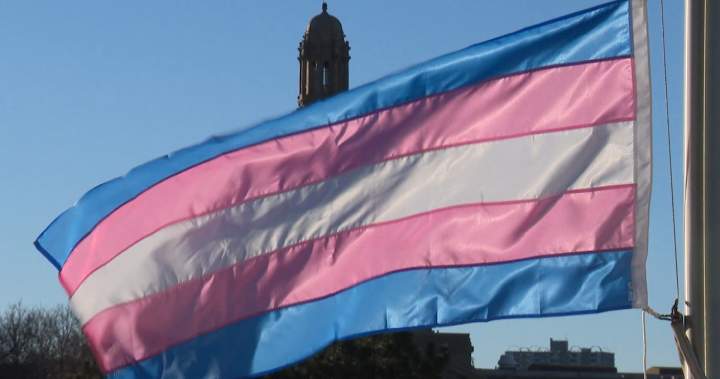The Alberta government has invoked the Charter’s notwithstanding clause for the second time in less than a month. In this case, to protect from legal challenge a trio of laws affecting transgender youth and adults.
Bill 9, the Protecting Alberta’s Children Statutes Amendment Act, will amend the Health Statutes Amendment Act, 2024, the Education Amendment Act, 2024, and the Fairness and Safety in Sport Act.
Premier Danielle Smith says the move is necessary to protect children’s health and well-being, which she added could be jeopardized if challenges to the laws are tied up in court for a long time.
“This government does not turn to the notwithstanding clause unless the stakes warrant it, and in this case, the stakes could not be higher,” Smith told reporters in a news conference Monday before the bill was introduced Tuesday.
“This is one of the most consequential actions our government will take during our time in office.”
The three laws were passed more than a year ago and affect transgender and gender-diverse youth in health care, in schools and in competitive sports.
Two of those laws face constitutional court challenges.
The focus of much of the legal debate surrounds the law on health care. It prohibits doctors from providing treatment such as puberty blockers and hormone therapy to those under 16 for purposes of gender reassignment.

LGBTQ+ advocacy groups have challenged that in court, calling it unconstitutional and a threat to the health of gender-diverse youth. This summer, a judge agreed and put that part of the law on hold pending a full airing of the issues.

Get breaking National news
For news impacting Canada and around the world, sign up for breaking news alerts delivered directly to you when they happen.
The Canadian Medical Association is also challenging the law, calling it “unprecedented” interference in the doctor-patient relationship that risks expanded political interference in other areas, such as vaccination and reproductive health.
A second law makes changes in schools. It requires parents to be notified if a child under 16 wants to change their name or pronoun at school for reasons of gender identity. LGBTQ+ advocacy groups are also challenging that on constitutional grounds, but for now it remains in force.
The government of Saskatchewan passed a similar school pronoun requirement law in 2023 and invoked the notwithstanding clause to shield it.

The third law compels schools, colleges and other governing bodies of amateur sport to adopt policies to ensure only those born female play in female-only leagues and divisions.
The notwithstanding clause is a rarely used constitutional convention that exists to ensure balance between the courts and duly elected governments. Governments can invoke the clause but must renew it every five years, tying the use of the clause to the normal term of a government.

Smith said they are following the wishes of Albertans.
“These measures reflect the views of an overwhelming majority of Albertans, and it is our responsibility to make sure that they are not overturned,” she said.
“These lawsuits could take years to resolve, including possible appeals to the Supreme Court. These delays are not acceptable to this government when children are in harm’s way.”
The health law, along with the treatment restrictions, also prohibits gender-reassignment surgery for those under 18.
“We cannot and will not take the risk of a child undergoing medical, hormonal or surgical interventions that could permanently limit or eliminate choices they may want to make as an adult to have children of their own one day,” Smith said.
This is the second time in three weeks that Smith’s government has invoked the notwithstanding clause.
On Oct. 27, her government invoked it to end a provincewide teachers strike and impose a labour contract that teachers previously rejected.

That move incited widespread criticism of government overreach, including by civil liberties organizations, labour unions, Amnesty International’s Canadian chapter, lawyer groups and the Anglican Diocese of Edmonton.
It also led some United Conservative Party caucus members to say they have been on the receiving end of a barrage of calls and emails from constituents decrying the government’s decision.
The Alberta Teachers’ Association has filed a legal challenge against the government’s back-to-work order, arguing the use of the notwithstanding clause was improper and, therefore, invalid.
A hearing is set to take place in Edmonton on Thursday.
Justice Minister Mickey Amery, speaking alongside Smith on Monday, dismissed concerns about the government’s repeated use of the notwithstanding clause, arguing that it has not been used frequently.
“At the end of the day, I’ll stand by this,” Amery said, adding that the government’s new bill also overrides any right set out in the Alberta Bill of Rights and the provincial human rights code.
“We’re prepared again to use every single legal and constitutional tool to make sure that the health and well-being of our children are protected.”
© 2025 The Canadian Press


